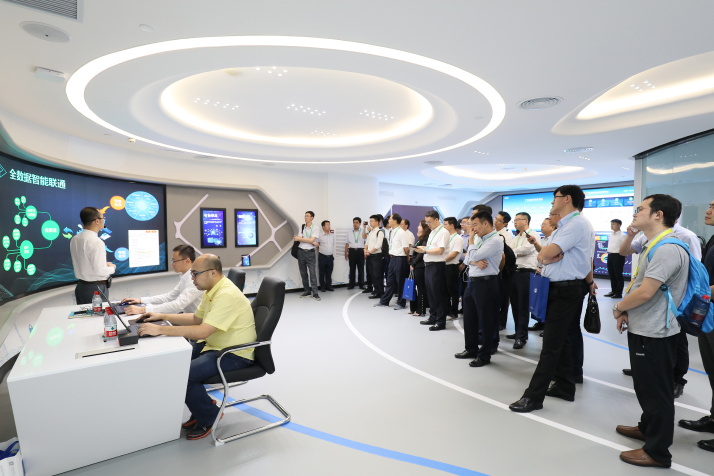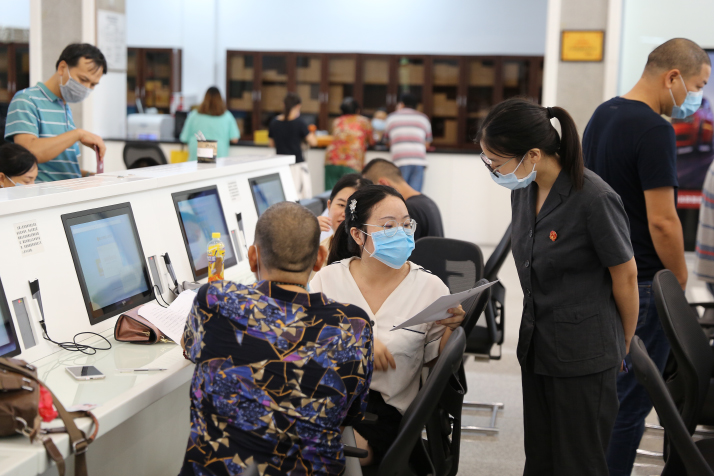| China |
| Digital technology makes courts more efficient and accessible | |
|
|
 Visitors at a smart court laboratory inside the Guangzhou High People's Court, Guangdong Province, on September 10, 2019 (XINHUA)
In Yuzhou, a city named after Yu the Great, a legendary ruler famed for taming floods in ancient times, avant-garde digital technology is being used in the court system. Earlier this year, the city, with a population of over 1 million, was put under lockdown due to COVID-19. Confirmed infections were also reported in other parts of Henan Province, where Yuzhou is located. During this trying time, Cao Huijuan, a Yuzhou People's Court judge, was able to settle a case involving a traffic accident liability dispute with the help of China's multi-purpose WeChat app. Cao first contacted the plaintiff and defendant via WeChat and telephone, obtaining their consent to settle the dispute through mediation via video link. Subsequently, she led them through the process on an applet called Mobile Micro Court. On January 18, the defendant agreed to pay more than 110,000 yuan ($17,314) in compensation to the plaintiff, who suffered multiple bone fractures in the accident. Cao then produced a digital settlement agreement, which the two parties signed electronically. The applet was first introduced in 2017 to Yuyao People's Court in Zhejiang, a province with a strong digital industry. It has been rolled out in courts across the country as part of a digitization strategy to make judicial proceedings more efficient and accessible. Era of e-justice A wide variety of cutting-edge technologies have recently been applied in Chinese courts, such as big data, cloud computing, artificial intelligence, blockchain, as well as voice, face and image recognition systems. As a result, case filing, evidence submission, court document delivery, trials and enforcement of court rulings can be carried out online. "In the face of the pandemic, smart courts have played big roles," Zhou Qiang, President of the Supreme People's Court (SPC), said in the top judicial body's work report delivered at the annual plenary session of the National People's Congress in March. He added that in 2021, over 11.43 million cases were filed and over 1.27 million trials were heard online. Throughout the year, courts at various levels accepted about 33.55 million cases. Speeding up the development of smart courts is a priority during the 14th Five-Year Plan (2021-25) period, Zhou said. The novel smart systems have been embraced for their convenience. They have saved troubles and greatly reduced costs for all parties involved in lawsuits, including the litigants and lawyers, Fan Ruijuan, a judge from Ningbo Intermediate People's Court in Zhejiang, said. She added this is particularly true for labor disputes involving highly mobile migrant workers. According to Fan, in some cases she has handled, the migrant workers involved had already returned to their native Guizhou, a southwestern province far from Ningbo, before their court hearings. Through the use of the smart court app, they did not have to travel back to the eastern coastal city for their court appearance. The work of lawyers, too, has been changed by digital technology. "We used to travel frequently to attend court sessions and meet the various parties in person. Now, many meetings and court sessions take place online, making participation easy and more accessible," Zhang Guang, senior partner at Beijing Qiancheng Law Firm, told Beijing Review. He said roughly one third of his cases since the start of the pandemic have been handled online, and so have approximately 60 percent of the cases in the first three months of this year due to a resurgence in COVID-19 cases. In addition to using the digital technology to settle disputes remotely, courts also use chatbots—intelligent user-interface software programs—to process information and give free legal advice. The Zhineng Xiaofa system, created by Mizhi County People's Court in Shaanxi Province, is available through the court's WeChat page. Its question-and-answer database contains answers to tens of thousands of questions involving procedural and substantive legal procedures, and its library provides access to laws as well as millions of past cases. After a user enters a question, the chatbot will deliver related answers. The Shanghai High People's Court launched an automated criminal case handling platform, the 206 System, four years ago. Relying on technologies such as big data and cloud computing and featuring machine learning ability, it can review case materials, identify flaws in evidence, and extend advice on sentencing. Cui Yadong, President of the Shanghai Law Society, said that with increasing intelligence capability, the system has shifted from being a tool used by judges to become the judges' assistant. Nevertheless, he ruled out the possibility that the system will replace judges.  Residents use the self-service system to file lawsuits in Nanhai District People's Court, Foshan City, Guangdong Province, on August 6, 2020 (XINHUA)
Step by step The digitization of the court system has picked up speed in recent years. SPC Vice President Jiang Wei said this acceleration began in 2012. In 2013, the SPC set up a centralized court data management platform, and by 2016, all courts nationwide had been connected to it. The initiative to build smart courts was launched in 2016. After a reform in 2015 to make it easier to file lawsuits, courts saw a remarkable increase in the number of cases, placing a heavier burden on judges, according to Jiang. During this period, the number of disputes involving virtual products and services was also on the rise, posing new challenges to judicial authorities. Specialized courts to deal with such cases were created in Hangzhou, Zhejiang, in 2017, and in Beijing and Guangdong's provincial capital of Guangzhou in 2018. Other courts also began to use smart apps to help with their work. "Smart courts were promoted not only to save manpower and brainpower, but also to reduce biases and standardize adjudication," Jiang said. Computer systems can recommend similar cases to judges working on certain lawsuits, and send reminders to the presiding judge and other superiors if a draft ruling deviates seriously from those of precedent cases, wrote Zheng Ge, a professor at the Koguan School of Law at Shanghai Jiao Tong University, in a paper published in China Social Science Review, a journal under the Chinese Academy of Social Sciences. Wen Xiang, associate professor with the Faculty of Law at the University of Copenhagen in Denmark, said smart courts have the potential to promote quality of justice, improve judicial efficiency, and provide convenience for the people. Nevertheless, he also has concerns regarding issues including potential bias in the algorithms used in smart courts, possible inaccuracies in algorithm- and data-based decision-making mechanisms, inadequate regulations on data security and privacy protection, and unequal access to technology. As to whether robots will ever replace judges and lawyers, Jiang gave his opinion during a lecture at Peking University in December 2020. He said while AI is based on mathematical computing capacity, many legal issues cannot be converted into mathematical problems. "The judges' work spans diverse areas and the judicial process is quite complex," Jiang stressed, adding that when giving a ruling, judges need to take into account many factors, such as mainstream social values and social norms, as well as the political, legal and social implications of the cases. "It is technically and legally impossible for intelligent machines to completely replace judges," Jiang concluded. (Print Edition Title: A Smart Move) Copyedited by G.P. Wilson Comments to wanghairong@cicgamericas.com |
|
||||||||||||||||||||||||||||||
|